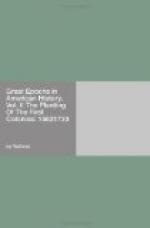All disputes soon disappeared in the face of a vast common misfortune. Whatever internal symptoms of weakness might already display themselves in the vast fabric of the Spanish empire, its rulers showed as yet no lack of jealous watchfulness against any attempts to rival her successes in America. The attempts of Cartier and Roberval[3] had been watched, and the Spanish ambassador at Lisbon had proposed to the King of Portugal to send out a joint armament to dispossess the intruders. The king deemed the danger too remote to be worth an expedition, and the Spaniards unwillingly acquiesced. An outpost of fur traders in the ice-bound wilderness of Canada might seem to bring little danger with it. But a settlement on the coast of Florida, within some eight days’ sail of Havana, with a harbor whence privateers might waylay Spanish ships and even attack Spanish colonies, was a rival not to be endured. Moreover, the colonists were not only foreigners but Huguenots, and their heresy served at once as a pretext and stimulus to Spanish zeal.
The man to whose lot it fell to support the monopoly of Spain against French aggression was one who, if we may judge by his American career, needed only a wider field to rival the genius and the atrocities of Alva. Pedro de Menendez, when he had scarcely passed from boyhood, had fought both against the French and the Turks, and had visited America and returned laden with wealth. He then did good service in command of the Spanish fleet in the French war, and his prompt cooperation with the land force gave him a share in the glories of St. Quentin.[4] A second voyage to America was even more profitable than the first, but his misconduct there brought him into conflict with the Council of the Indies, by whom he was imprisoned, and heavily fined. His previous services, however, had gained him the favor of the court. Part of his fine was remitted, and he was emboldened to ask not merely for pardon, but for promotion. He proposed to revive the attempt of De Soto and to extend the Spanish power over Florida. The expedition was to be at Menendez’s own cost; he was to take out five hundred colonists, and in return to be made Governor of Florida for life and to enjoy certain rights for free trade with the West Indies and with the mother country....
The military genius of Menendez rose to the new demands made upon it. He at once decided on a bold and comprehensive scheme which would secure the whole coast from Port Royal to Chesapeake Bay, and would ultimately give Spain exclusive possession of the South Seas and the Newfoundland fisheries. The Spanish captain had a mind which could at once conceive a wide scheme and labor at the execution of details. So resolutely were operations carried on that by June, 1565, Menendez sailed from Cadiz with thirty-four vessels and four thousand six hundred men. After a stormy voyage he reached the mouth of the St. John’s river. Ribault’s party was about to land,




